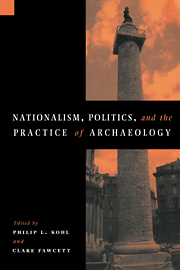Book contents
- Frontmatter
- Contents
- List of maps
- List of contributors
- Acknowledgments
- Part I Introduction
- Part II Western Europe
- Part III Eastern Europe and Eurasia
- 7 Archaeology and ideology in southeast Europe
- 8 From internationalism to nationalism: forgotten pages of Soviet archaeology in the 1930s and 1940s
- 9 Postscript: Russian archaeology after the collapse of the USSR – infrastructural crisis and the resurgence of old and new nationalisms
- 10 Nationalism, politics, and the practice of archaeology in the Caucasus
- Part IV East Asia
- Part V Commentary
- Bibliography
- Index
7 - Archaeology and ideology in southeast Europe
Published online by Cambridge University Press: 06 October 2009
- Frontmatter
- Contents
- List of maps
- List of contributors
- Acknowledgments
- Part I Introduction
- Part II Western Europe
- Part III Eastern Europe and Eurasia
- 7 Archaeology and ideology in southeast Europe
- 8 From internationalism to nationalism: forgotten pages of Soviet archaeology in the 1930s and 1940s
- 9 Postscript: Russian archaeology after the collapse of the USSR – infrastructural crisis and the resurgence of old and new nationalisms
- 10 Nationalism, politics, and the practice of archaeology in the Caucasus
- Part IV East Asia
- Part V Commentary
- Bibliography
- Index
Summary
History, after all, is nothing more than a pack of tricks we play on the dead.
VoltaireNowhere has it been made more horrifyingly clear that the past is a prize, a resource to covet and for which to contend, than in the west Balkans today. When the towers and walls of ancient towns are shelled for no military purpose, when medieval churches and mosques become targets, and when the calls to arms unfurl histories like banners, then it is starkly apparent to what extent the past can intertwine with the present – and to what effect. Memories, real and imagined, ancient and new, sustain the civil conflict in Croatia and Bosnia and Hercegovina as much as any weapon. The wars of the Balkans unequivocally show that possession of the past is no trifling matter, and that the construction of the past is fraught with consequence. One need look no further than the ranges, valleys, and fields of the Dinaric Mountains to see that the past and the present are inextricably bound together.
As the papers in this volume demonstrate, archaeologists have recently exhibited a growing concern about two aspects of the relationship between past and present. First, it is coming to be appreciated that many of the notions about the past held by archaeologists are derived from present conditions. Secondly, it appears that, often, archaeological efforts are geared overtly or covertly toward serving a political agenda of the present.
- Type
- Chapter
- Information
- Nationalism, Politics and the Practice of Archaeology , pp. 99 - 119Publisher: Cambridge University PressPrint publication year: 1996
- 7
- Cited by



